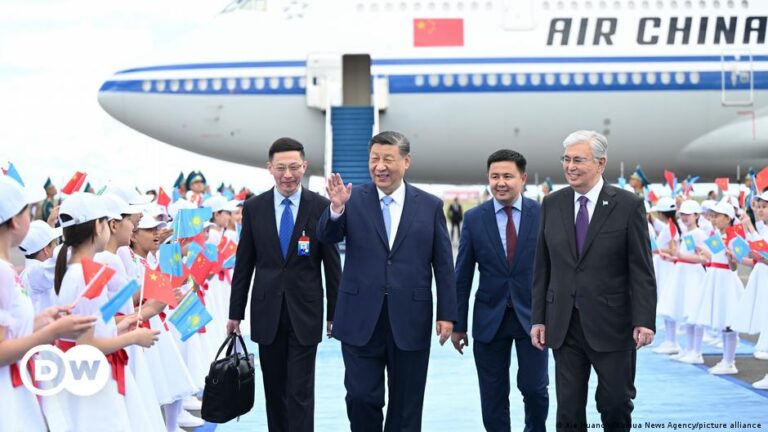“Ni hao, Fanying!” These were the words with which Kazakhstan’s President Kasymshomart Tokayev greeted Chinese President Xi Jinping as he arrived at the airport in the capital, Astana, to attend the Shanghai Cooperation Organization summit.
At 71, Tokayev is just a month older than Xi, speaks fluent Mandarin and served as the Soviet diplomat in Beijing from 1985 to 1991.
It’s not just the language barrier that makes the two sides get along so well: the heads of state of Kazakhstan and China also share common interests.
The SCO was founded in 2001 by Russia, China and the authoritarian Central Asian states, including Kazakhstan, Kyrgyzstan, Tajikistan and Uzbekistan.
The club now also includes India, Iran and Pakistan.
Astana currently holds the presidency of the coalition.
China’s first multilateral initiative
The SCO’s basic goals were to strengthen mutual trust, promote cooperation and reduce tensions in the region after the collapse of the Soviet Union.
“The SCO was a multilateral initiative first launched by China in 1996,” said Eberhard Sandschneider, a partner at the Berlin Global Advisors think tank. “Once it became clear that it was working well with the three Central Asian countries and the Russian Federation, it was institutionalized as the SCO in 2001.”
China and Russia have since expanded the club’s mission to focus on counterterrorism in the region.
For example, Beijing wants to combat “terrorism, extremism and separatism” in the far-western Xinjiang Uighur Autonomous Region.
China blames the province’s majority Muslim Uighurs for many of the country’s terror attacks.
For China, the issue is more important than ever, as Beijing views with great concern the activities of the Turkestan Islamic Party (TIP), which wants Xinjiang to secede from China and become an independent state of East Turkestan.
The United Nations and the European Union classified TIP as a terrorist organisation in 2002.
Jihadists are also active in Central Asia, Afghanistan and Pakistan, which are considered home bases for many militant groups.
The rugged mountainous terrain and unclear borders make it difficult for the government to monitor and control extremist activity.
“Against outside interference”
But China wants more. Wednesday evening’s meeting between Russian President Vladimir Putin and President Xi Jinping, the second face-to-face meeting between the two leaders in six weeks, made it clear that China expects much more from the SCO.
“Amid constantly changing international situations, we must strive to safeguard the legitimate rights and interests of all countries and uphold basic norms in international relations,” Xi said.
On Thursday, China’s president was even clearer, saying, “We should join hands to resist outside interference, firmly support each other, address each other’s concerns, and firmly take control of the future and destiny of our two countries, as well as regional peace and development, into our own hands.”
Xi also wants to see more active regional alliances. The final statement touched on issues including the economy, securing the supply chain, the digital economy, energy security, cultural and social exchanges, and artificial intelligence.
However, the SCO avoided mentioning the formation of a new geopolitical bloc.
Instead, the statement said the group was non-aligned and not directed against any third party.
“The SCO seeks objective cooperation. The more the SCO’s influence grows, the more representative and prominent it will be in the Southern Hemisphere. China is playing an exemplary role, showing Central Asian countries how to reach economic agreement despite political differences,” said Liu Qingbin of Yokohama University.
SCO Plus?
The summit was held in an expanded format for the first time, despite the absence of Indian Prime Minister Narendra Modi. Turkish President Recep Tayyip Erdogan and UN Secretary-General Antonio Guterres also attended the meeting.
“The SCO has always attached great importance to security and growth, two of the most important issues in effective global governance. Security guarantees growth and growth promotes security,” Liu said.
“But the SCO is ultimately just one of several multilateral initiatives that China supports,” said China expert Sandschneider, pointing to the Belt and Road Initiative, BRICS+ and the regional free trade area RCEP.
“China is building alternative global institutions to appeal to its friends. In principle, these are authoritarian states, all of which have a distinctly anti-Western character.”
Sanschneider added that everyone, including Western countries, should understand that the international order that emerged after the Second World War is “a bit outdated.”
“This has to do with China-led authoritarian efforts, but also with domestic political dynamics in the United States and the European Union,” he said. “That’s why some see this as an opportunity to challenge or completely undermine the dominance of the West, which has long been seen as paternalistic.”
The SCO welcomed a new member in Astana: Belarus, another ally of Moscow and Beijing.
Belarusian leader Alexander Lukashenko has ruled his country with an iron fist for the past three decades.
China in particular is looking to deepen ties with Belarus, where the youngest son of Belarusian leader Nikolai Lukashenko was born in 2004 and is currently studying biology at China’s prestigious Peking University.
This article was originally written in German and edited by Kate Martyr.
“Decoding China” is a DW series that examines China’s positions and claims on current international issues from a critical German and European perspective.

